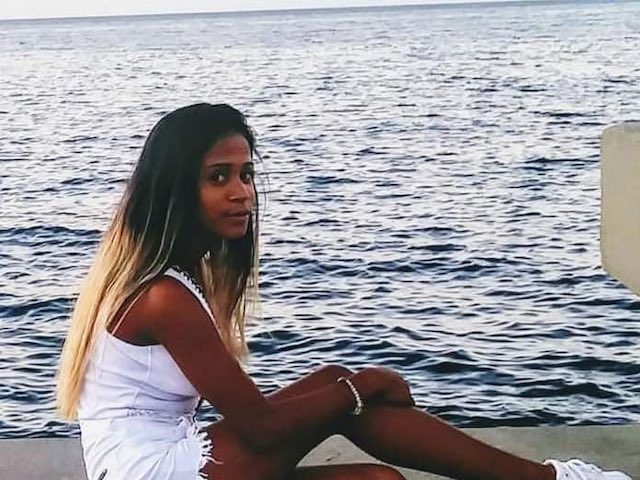The family of 17-year-old Gabriela Zequeira Hernández confirmed this weekend that the Communist Party of Cuba had sentenced her to eight months in prison for “public disorder” despite her insistence that she was not an active participant in the July 11 protests.
After an international outcry followed the news that Zequeira would serve an eight-month sentence in one of Cuba’s most notorious political prisons, Cuban police altered the sentence to eight months of house arrest. Zequeira would retain her criminal record, however, despite being a minor, having no criminal history, and no evidence suggesting she was protesting the communist regime.
Thousands of Cubans nationwide organized spontaneous protests on Sunday, July 11, calling for an end to the 62-year-old communist regime. The protests were overwhelmingly peaceful, consisting of marches in major city plazas and down the roads of smaller towns and villages. The Castro regime responded to the protests with disproportional violence, firing live ammunition into crowds and beating suspected protesters in public. In the immediate aftermath of the protests, the regime shut down nationwide access to the internet and ordered door-to-door raids of homes in the cities that had the largest protest turnout. The little video and images that Cubans have managed to smuggle out of the country indicate that police have identified protesters and beaten them in their own homes – in some cases shooting them despite them not appearing to present any threat – and disappeared them into the legal system.
Human rights activists have denounced the regime for the mass arrest and disappearance of hundreds of people. Evidence compiled by non-governmental organizations indicates that the Castro regime is using mass sentencing procedures to rapidly process and imprison protesters.
Zequeira’s mother told the independent outlet Cubanet that her teen daughter was among those processed in such a way, arrested and processed in a “trial” with 11 other women. In between July 11, when she was arrested, and July 13, mother Yoanis Hernández Cuadra knew nothing of her daughter’s fate – she had disappeared on her way to get a haircut, her mother said, in her native Havana. On July 13, police officers told Hernández that her daughter had been arrested and was currently in 100 y Aldabó, one of Cuba’s most notorious political prisons.
Officers told Hernández, the mother said, that her daughter “was not involved in protests and could leave with just a fine.” On July 22, Zequeira was sentenced to eight months in prison on charges of “public disorder.”
“She was just watching because she had never seen a protest before,” Hernández told Cubanet.
The mother noted that, among the 12 women and girls sentenced simultaneously in a summary trial was another 17-year-old girl alongside her mother. All left convicted of similar “counterrevolutionary” charges.
The BBC confirmed on Monday that, in the early hours of that day, police had returned Zequeira to her house and sentenced her to house arrest instead of prison time, a decision that appeared to occur in response to international condemnation of the sentencing of a minor in a trial alongside adults that took minimal evidence into consideration. Hernández told the BBC that Zequeira had suffered “psychological abuse” at 100 y Aldabó. Her descriptions included acts of torture like sleep deprivation.
The Spanish NGO Cuban Prisoners Defenders published a detailed analysis of the way the Cuban Communist Party has begun legally processing July 11 protesters. The group has documented cases of as many as 30 people being tried in the same procedure. The state is systematically denying the imprisoned basic due process rights like access to an attorney or even knowing what crime they stand accused of until as recently as an hour before the trial. A prosecutorial system barely exists, meaning police decide what to accuse prisoners of without prosecutors compiling indictments or formally charging them.
“From the time in which police open an ‘investigation’ to the trial, the majority of cases last between 48 and 96 hours,” Cuban Prisoners Defenders revealed.
The Cuban dissident group Cuba Decide has documented 742 people either known to have been arrested or simply disappeared since July 11 as of Monday. On the list are the names of several prominent longtime political dissidents, including at least two arrested during the “Black Spring” protests of 2003: Ángel Moya and José Daniel Ferrer.
Also still missing is a man identified as Ernesto Frank Sánchez Aguilar who is not known to have participated in the July 11 protests but executed a single act of dissidence the next weekend: interrupting a large “act of revolutionary affirmation” orchestrated by the regime by shouting “freedom!” in front of international media cameras. Cuban state security agents proceeded to publicly beat him and take him away; his whereabouts remain unknown.
Al menos 742 personas han sido detenidas y/o desaparecidas
562 continúan detenidas y/o desaparecidas
180 han sido liberadas
*Esta cifra es inferior al total real y debe ser complementada #SOSCuba pic.twitter.com/9Vre3CN8wX
— CUBADECIDE (@CUBADECIDE) July 26, 2021
Cuban Foreign Minister Bruno Rodríguez responded to pressure from the free world this weekend by claiming that police arrested no minors and that Cuba respects human rights. The Spain-based publication Diario de Cuba noted that Cuba’s own attorney general, Yamila Peña, had stated in a press conference prior to Rodríguez’s remarks that police indeed had arrested minors and that their cases “are being evaluated.”
Rodríguez has blamed the United States in prior comments for single-handedly orchestrating the July 11 protests, a claim for which no evidence exists.

COMMENTS
Please let us know if you're having issues with commenting.